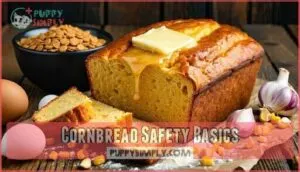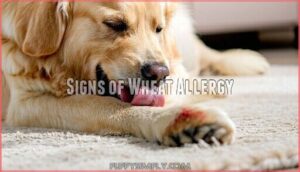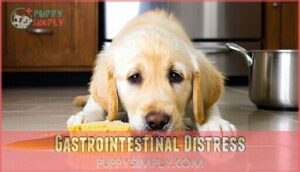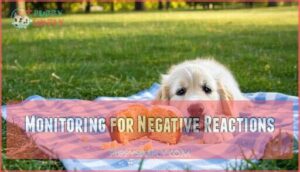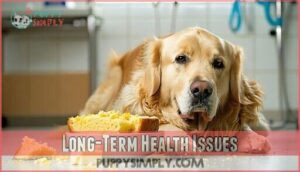This site is supported by our readers. We may earn a commission, at no cost to you, if you purchase through links.
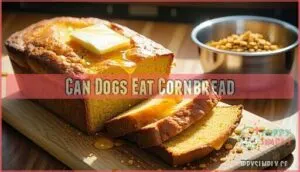
Cornbread itself isn’t toxic for dogs, but some recipes include ingredients that could upset their stomach or harm them, like onions or excessive sugar.
Stick to simple recipes without additives, and remember, moderation is key—too much cornbread could lead to weight gain or digestive trouble.
If your dog has a wheat allergy or sensitive stomach, cornbread might not be the best option.
Want healthier alternatives? Consider vet-approved treats or fresh fruits and veggies to keep your pup happy and healthy.
Table Of Contents
Key Takeaways
- Stick to plain, simple cornbread without sugar, butter, or spices to keep it safe for your dog.
- Avoid harmful ingredients like onions, garlic, and xylitol, which can cause serious health problems.
- Share cornbread as an occasional treat in small portions since it offers little nutritional value for dogs.
- Watch for signs of allergies or stomach issues like vomiting or diarrhea after feeding your dog cornbread.
Cornbread Safety Basics
When you’re wondering if your dog can safely eat cornbread, you’ll need to understand which ingredients are safe and which ones can cause serious health problems.
Basic cornbread made with wheat flour, cornmeal, milk, and eggs won’t harm your dog in small amounts, but added ingredients like garlic, onions, or excessive butter can create dangerous situations.
Ingredients in Cornbread
When you’re eyeing that golden cornbread, here’s what’s typically inside: cornmeal (fine, medium, or coarse), all-purpose flour, baking powder, salt, and milk or eggs.
These basic cornbread ingredients dogs can handle in small amounts. However, sweeteners used like excess sugar, fat content from butter, and flour alternatives can vary by recipe.
Always check labels for toxic ingredients before sharing – stick with plain, simple versions for safety. Some dogs may experience gastrointestinal distress from cornbread.
Toxic Ingredients to Avoid
Onions and garlic are top offenders in the matter of toxic cornbread ingredients.
They can cause serious issues for your dog’s red blood cells, leading to anemia.
Spicy peppers wreak havoc on digestion, while xylitol, a common sweetener, is potentially deadly.
Harmful spices like nutmeg also pose risks to your dog’s nervous system.
Don’t forget about hidden fats and salts.
Excess butter or salty mixes may trigger pancreatitis, a severe condition.
Watch for these ingredients:
- Onions and garlic
- Spicy peppers
- Xylitol concerns
- Excess butter
Safe Ingredients for Dogs
When making cornbread for dogs, simplicity is key.
Stick to dog-safe ingredients like a pinch of safe bacon, safe cheese, or herbs such as parsley and dill for flavor.
Add safe peppers or plain corn kernels for texture.
Avoid toxic cornbread ingredients to keep it worry-free.
A dog-friendly cornbread recipe can be a fun, safe treat with thoughtful choices.
Can Dogs Eat Cornbread
Yes, dogs can eat cornbread, but it’s not always a perfect snack. If you’re wondering, “Is cornbread safe for dogs?” the answer depends on what’s inside it.
Plain cornbread made with safe ingredients—like cornmeal, eggs, and milk—can be shared in small amounts. However, cornbread risks for dogs increase when recipes include sugar, butter, or harmful add-ins like garlic or scallions.
Even “dog-friendly cornbread” should only be an occasional treat since it provides little nutritional value. Be aware that sugar can cause issues for your dog.
Be mindful of portion sizes. A bite-sized piece is a safe cornbread amount for most dogs, especially if they’re small or prone to food allergies. Check labels or opt for homemade cornbread to avoid hidden ingredients.
Homemade vs. store-bought? Homemade wins for better control over cornbread ingredients and peace of mind. Always consider your dog’s individual dietary needs!
Cornbread Risks and Guidelines
Feeding your dog cornbread comes with some risks, especially if it contains harmful ingredients like butter, sugar, or spices.
Cornbread can be a risky treat for dogs—avoid harmful ingredients like butter, sugar, or spices to keep your pup safe.
It’s important to understand how certain ingredients can affect your pet’s health and know the signs of potential issues, including the impact of harmful ingredients.
Signs of Wheat Allergy
Wheat allergies in dogs often show up as skin irritation, including redness, itchiness, and flaky patches.
Digestive troubles like vomiting symptoms or diarrhea signs may also occur. Breathing issues and chronic reactions signal deeper food sensitivities.
Certain dog breeds are more likely to face these allergic reactions. Allergy testing helps pinpoint triggers and guide treatment.
One key sign is constant licking of the paws.
- Common allergy symptoms:
- Red, itchy, flaky skin
- Vomiting or diarrhea
- Constant ear infections
- Hair loss patches
- Foot licking or chewing
Gastrointestinal Distress
Cornbread digestion in dogs can be tricky and lead to gastrointestinal distress. Watch for signs like dog vomiting, diarrhea, or lethargy.
To keep your pup comfy:
- Limit fatty or sugary ingredients to prevent diarrhea causes.
- Offer fresh water to address dehydration risks.
- Look for excessive gas in dogs or gulping issues indicating discomfort.
Monitor appetite loss closely!
Monitoring for Negative Reactions
If your dog eats cornbread, watch closely for allergy symptoms or digestive changes.
Look out for vomiting, diarrhea, appetite loss, or even behavioral shifts. Skin reactions can also signal an issue.
Here’s a quick guide:
| Symptom | Potential Cause | Action |
|---|---|---|
| Vomiting | GI distress | Withhold food, offer water |
| Diarrhea | Allergy symptoms | Observe symptom severity |
| Appetite loss | Digestive upset | Consult a vet if prolonged |
Stay alert and consult your vet for unexpected signs!
Long-Term Health Issues
Feeding cornbread too often can lead to weight problems and long-term health risks.
High carbs and sugars are troublemakers for diabetes in dogs and obesity risks. Butter raises pancreatitis concerns, and dietary imbalance strains dogs over time.
- Obesity risks from extra carbs.
- Spiking blood sugar levels leads to diabetes concerns.
- Pancreatitis develops with excess butter.
- Kidney problems worsen with poor diets.
- Heart disease ties to long-term poor nutritional choices.
Healthy Alternatives to Cornbread
If you’re looking for healthier snack options than cornbread for your dog, there are plenty of safe and nutritious choices.
Simple treats like plain popcorn, fresh fruits, or homemade dog biscuits can offer a tasty alternative without unnecessary risks.
Plain Popcorn as a Treat
Plain popcorn can be a tasty, low-calorie dog treat when prepared the right way.
Stick with air-popped popcorn using no butter, salt, or oils. It’s a great occasional snack that provides fiber for digestion.
Keep servings small—just 2-3 kernels at a time—to avoid stomach issues or choking risks. Want safe toppings? Skip them altogether to keep things simple.
As with cornbread or any dog treats, moderation is key for happy, healthy pups, and it’s essential to remember that occasional snacking is the way to go.
Dog-Specific Treats
In the context of treating your dog, commercial options like dog-specific treats are much better than cornbread.
They’re designed with nutritional value, portion sizes, and dietary needs in mind. Plus, it’s easy to find ones made from quality proteins and free of fillers like corn or soy.
Homemade dog treats are another great choice for a personalized touch using dog-safe foods. Try creating a dog-friendly cornbread recipe for special occasions!
Many owners find success using specialized training products for positive reinforcement.
- Benefits of dog-specific treats:
- Customized nutrition
- Portioned for safety
- Fewer harmful ingredients
- Great for training sessions
Fruits and Vegetables as Treats
Regarding safe human foods for your pup, safe fruits and veggies make excellent dog treats.
Carrot sticks or green beans offer veggie benefits, while apple slices (without seeds) are delicious and healthy.
Keep portion sizes small to avoid tummy troubles, and steer clear of toxic produce like grapes or onions.
Treat preparation is simple here—just wash, chop, and serve!
Compared to cornbread for dogs, these options are safer and far better for their overall health.
Homemade Dog Treats
If cornbread isn’t on your dog’s menu, Healthy Recipes like homemade dog treats are a great pick.
Swap harmful ingredients like butter for dogsafe alternatives such as oats or pumpkin puree. Dogfriendly baking includes simple Ingredient Swaps to keep treats nutritious.
Try a homemade cornbread using dogsafe ingredients like peanut butter or rolled oats for extra fiber. Many owners find baking dog snacks very rewarding.
Focus on portion sizes to prevent overfeeding, and use airtight storage tips to keep your dog treats fresh longer, which is a key part of dogfriendly baking and making homemade dog treats.
Veterinary Consultation and Precautions
If you’re unsure about feeding cornbread to your dog, it’s always a good idea to check with a veterinarian first.
They can help you understand potential risks and whether it’s a safe option for your pet.
Symptoms Requiring Vet Care
Certain symptoms after eating cornbread mean you should contact a vet right away.
Watch for severe vomiting, bloody stool, extreme lethargy, or persistent pain.
Allergic reactions like itchy skin or rashes can signal food allergies and require immediate vet care.
If your dog shows constant gulping, retching, or abdominal discomfort, it could indicate serious gastrointestinal issues needing quick attention.
Early action protects your dog’s health—don’t ignore warning signs like sudden appetite loss or unusual behavior, including signs of severe vomiting or bloody stool.
Withholding Food and Monitoring
If your dog eats cornbread, pause feeding for a few hours.
This helps prevent bloating while allowing safe cornbread digestion.
Keep fresh water handy and observe closely for symptoms like vomiting or discomfort.
Track any adverse reactions in a food diary.
Prompt vet communication guarantees your dog’s gastrointestinal health.
Monitoring cornbread risks lets you tackle digestive observation and potential allergies early.
Consulting With a Veterinarian
If your dog experiences emergency signs like vomiting, diarrhea, or unusual lethargy after eating cornbread, it’s wise to seek veterinary advice immediately.
A veterinarian consultation guarantees dietary changes are safe and suited to your pup’s health, including breed predispositions.
Online vet consultations can also provide personalized advice.
Consistent training can help establish healthy manners for your dog.
Always rely on veterinary expertise to address allergy symptoms promptly and prevent unnecessary risks to your dog’s well-being.
Prioritizing Dog-Specific Foods
Your pup’s health thrives on a Balanced Canine Diet suited to their unique needs.
Stick to Nutritional Dog Foods or Homemade Dog Food made with safe ingredients like oats or pumpkin.
Always check Dog Food Labels for harmful ingredients and avoid generic Commercial Food Concerns, and prioritize dog-specific treats designed for dog dietary needs, as cornbread offers little nutritional value and risks triggering dog allergies.
Frequently Asked Questions (FAQs)
Can dogs eat cornbread?
Sharing a slice of sunshine, cornbread is generally safe for dogs in small amounts.
Stick to plain recipes without butter, sugar, or spices, as extras can upset their stomachs.
Moderation keeps tails wagging happily, with moderation being key to their happy tails.
Can dogs eat corn muffins?
Corn muffins are safe for dogs in small amounts if plain and free of harmful mix-ins like butter, sugar, or scallions.
Stick to moderation, and always watch for any unusual reactions after feeding.
Can dogs eat cornmeal?
Cornmeal is generally safe for dogs in small amounts if it’s plain and free of additives.
However, it doesn’t offer much nutritional value.
Keep it occasional, and watch out for signs of allergies.
Is cornbread safe to share?
Yes, cornbread can be shared with your dog in small amounts if it’s plain and free of harmful ingredients like butter, garlic, or onions.
Keep it occasional, though—it’s more like dessert than dinner!
Can dogs eat jiffy?
Feeding your dog Jiffy cornbread is like giving dessert—it’s loaded with sugar and additives.
While a bite won’t hurt, it’s better to stick with homemade, dog-safe recipes without harmful ingredients like butter or onions.
Is cornmeal ok for dogs?
You can give your dog a bit of cornmeal in moderation.
It’s safe when plain, but don’t let it dominate their diet.
Keep it simple—skip added sugars, salts, and oils.
Can a dog eat cornbread dressing?
Think twice before sharing cornbread dressing with your dog—it’s stuffed with onions, garlic, and spices that can upset their stomach or worse.
Stick to plain, dog-friendly treats to keep your pup safe and happy.
Is corn good for dogs, yes or no?
Corn is safe for most dogs in moderation and offers some fiber and vitamins.
However, it’s not highly nutritious for them, so don’t overdo it.
Stick to plain corn without butter, salt, or seasonings.
What if my dog eats cornbread?
If your dog eats cornbread, keep an eye out for upset stomach signs like vomiting or diarrhea.
Small amounts are usually fine, but avoid cornbread with butter, sugar, or harmful ingredients like onions or garlic.
Can my dog have jiffy cornbread?
Over 60% of Jiffy cornbread mixes contain added sugar and fats, which aren’t great for dogs.
If you’re sharing, stick to a very small piece, and make sure there’s no butter or harmful extras.
Conclusion
If cornbread had a resume, it’d be listed under “sometimes safe” snacks for dogs.
While plain cornbread in small amounts is fine, be cautious of recipes with harmful ingredients like sugar, butter, or spices.
Always watch for signs of allergies or upset stomachs, especially if your pup is sensitive to wheat.
Stick to simple recipes and serve in moderation.
Still unsure? Regarding “can dogs eat cornbread,” your vet’s guidance is always your best bet.
- https://www.thesprucepets.com/can-dogs-eat-cornbread-5185075
- https://www.tryoriginlabs.com/blogs/pet/can-dogs-eat-cornbread-what-you-need-to-know?srsltid=AfmBOopZD8uLUK_7BIpidvp_F8s8SmlGFNm5kWO2IBLG-S7iWSmnDFPH
- https://www.petmd.com/dog/nutrition/can-dogs-eat-corn
- https://www.quora.com/I-ran-out-of-dog-food-so-I-have-to-feed-the-dogs-cornbread-for-two-more-weeks-Will-the-dogs-survive
- https://www.justanswer.com/dog-health/kjd5i-ate-jiffy-cornbread-mix-belly-looks-swollen.html

